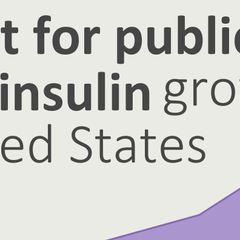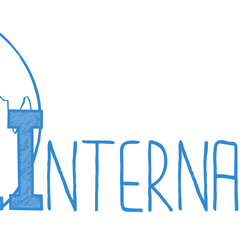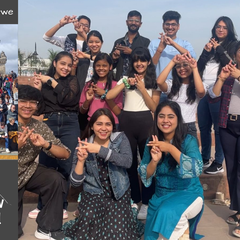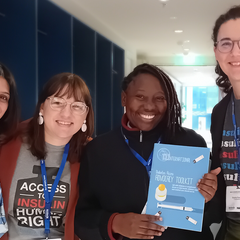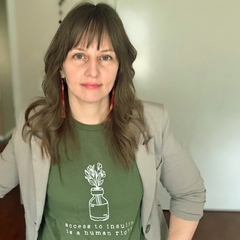
Insulin Shortages: a policy choice with policy solutions
8 May 2024, 4:38 p.m. in #insulin4all USA, Global Stories, Interviews by Shaina Kasper, Policy & Advocacy Director, T1International
Over the past few months, people with type 1 diabetes around the globe have been going from pharmacy to pharmacy in search of insulin. There have been insulin shortages in many different countries. For people living with type 1 diabetes, insulin is as important as oxygen and people need a consistent supply. Insulin shortages can lead to irreversible complications and even death.
Pakistan: When the Big Three insulin manufacturers stop selling to a country, the country could manufacture its own insulin
In Pakistan, the ongoing economic crisis has badly hit the healthcare system where patients have been struggling for essential medicines. Because of the massive Pakistani rupee devaluation against the US dollar, the big three insulin manufacturers, Eli Lilly, Novo Nordisk, and Sanofi, called for an increase in prices. When this price demand could not be met by the government, the Big Three halted importing insulins. This has resulted in extreme insulin shortages and hardships for patients.
"Shortages of insulin to a country with some of the highest diabetes rates in the world is unconscionable,” said Sana Ajmal, the Executive Director of Meethi Zindagi, an Advocacy Partner of T1International. “When there is so little competition from so few manufacturers, and the insulin manufacturers stop distributing according to the demand in the country, people with diabetes reliant on insulin to survive are left with basically no options. We know of children and young people who have suffered anxiety and trauma, as well as health issues due to these shortages, up to the extent that some have passed away."
Additionally, the insulin shortage has resulted in the government increasing the price of insulins in Pakistan, exacerbating the challenges faced by people living with diabetes throughout the country.
Meethi Zindagi holds a critical role in providing insulin to many patients living with diabetes in Pakistan. Meethi Zindagi organized an #insulin4all roundtable with health ministers, experts, representatives from pharmaceutical corporations, and others to address the issue. As an outcome from this event, they sent a letter to the prime minister and the cabinet urging them to intervene and implement recommendations by experts to ensure access to affordable insulin, primarily by having the government manufacture insulin.
Meethi Zindagi also called on the World Health Organisation (WHO) for support but has so far not received adequate response. “We have been disappointed with the World Health Organisation’s lack of meaningful engagement as directed by their own framework and by our ethical patient engagement principles in both this urgent crisis in Pakistan, and in our Fight for Five Campaign,” said T1International’s Fight for Five Working Group Co-Lead and Meethi Zindagi member Maham Tahir. “We recently sent a letter outlining our calls to action for the WHO to build meaningful civil society support to make insulin affordable and accessible to all.”
United States: When insulin manufacturers cannot guarantee insulin access to patients, one solution is to have the country manufacture its own insulin
Halfway across the world, and in an entirely different healthcare system, patients living with diabetes in the USA have also been facing shortages of critical insulin. Eli Lilly and Novo Nordisk both announced shortages of short-acting insulins, and patients have reported being unable to fill prescriptions of Sanofi’s Lantus as well.
In Kentucky, Angela Lautner was unable to get Eli Lilly’s insulin lispro filled at any pharmacy in her region, and was told that it was backordered for weeks. After many calls, she found one pharmacy in Ohio to fill the prescription but learned that the refill was canceled as they couldn’t accept Kentucky’s Medicaid plans. “The pharmacists couldn’t explain why there was an insulin shortage all of a sudden,” she said. “This added to the many tears I’ve cried over the years for simple insulin. Big Pharma’s price cuts mean nothing if patients still can’t access their essential insulin.”
These announcements of shortages came after research last year showed that patients often cannot access Eli Lilly’s Lispro at promised lower prices, and after the Big Three insulin manufacturers committed to lowering the prices of some insulins. Novo Nordisk’s long-acting insulin Levemir was discontinued following promised price reductions.
T1International collaborators, Mutual Aid Diabetes (MAD) have seen a 70% increase in insulin requests since January 2024, compared to 2023. Because of the USA insurance system structure, patients have to go back to their prescriber to get another insulin ordered if they come back from the pharmacy empty- handed, which is still not guaranteed to be in stock at local pharmacies.
“We need to have more than three insulin manufacturers so if and when there is a shortage of one insulin, for whatever reason, there are more insulin options to fill in the gaps. That’s why we need public pharma,” said Quinn Nichols, T1International’s State Working Group co-lead and Michigan #insulin4all Chapter Lead who has also experienced challenges getting insulin due to shortages. Michigan is currently working on policies to enable public production of insulin in the state.
Public pharma refers to placing the manufacturing, distribution, and pricing of prescription drugs like insulin into public, rather than corporate, hands. Public pharma can offer a long-term solution to high-cost pharmaceuticals, drug shortages, and discontinuations that are happening in the USA and across the globe.
To learn more about public pharma in the US, see our toolkit.
If you’re struggling with insulin costs, reach out to Mutual Aid Diabetes, and check out these other resources.






